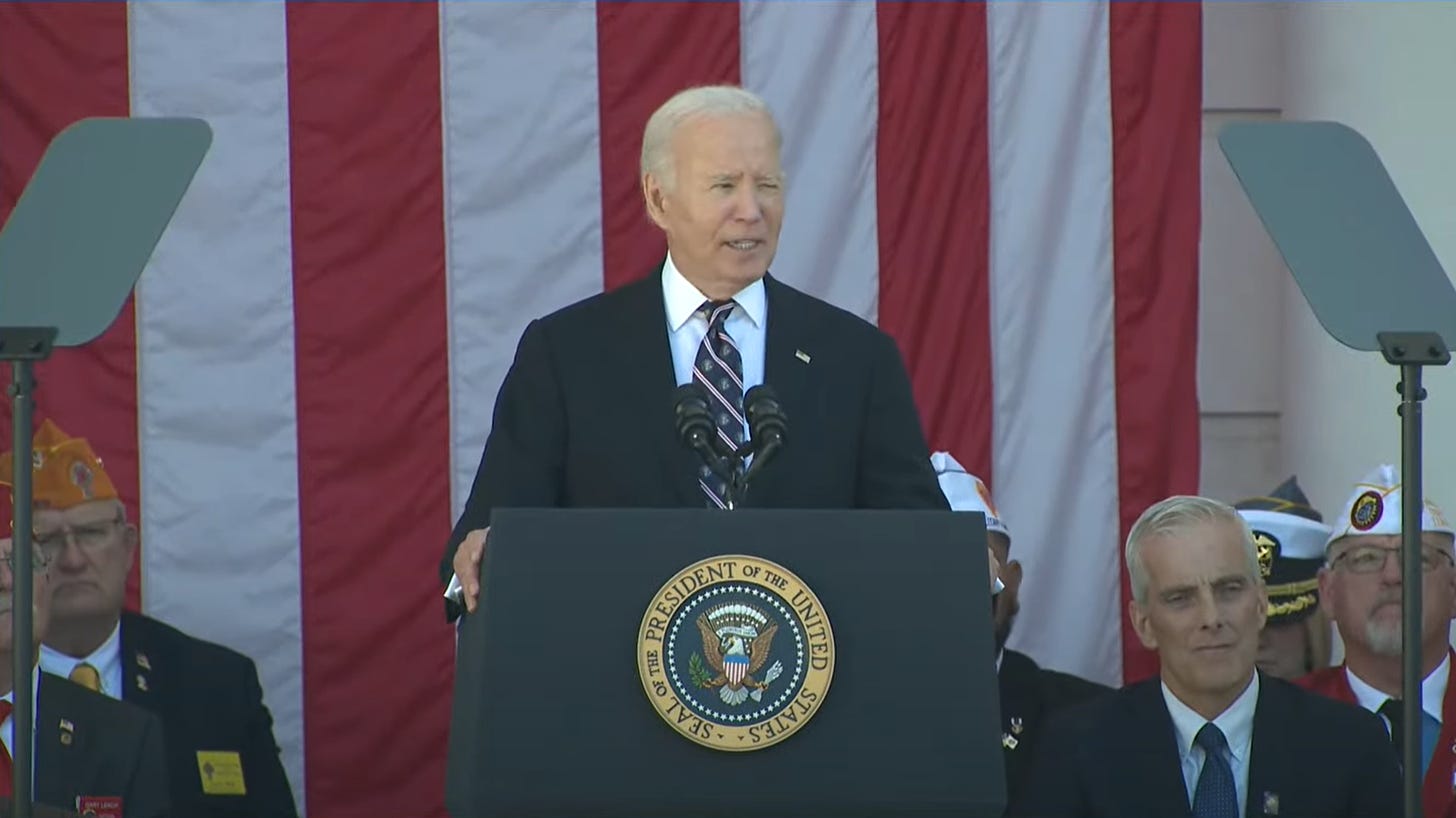President Biden expressed deep respect for American veterans and their families in his Veterans Day address at the Memorial Amphitheater, underscoring what he called America’s “sacred obligation” to support those who have served. Drawing from history, he invoked the words of President Lincoln, who urged the nation to “care for him who shall have borne the battle.” Biden acknowledged that the country’s commitment to its military personnel transcends political divisions, uniting all Americans in a shared responsibility. This commitment, he said, has been central to his presidency, especially as he stands for the final time at Arlington as Commander-in-Chief.
Reflecting on the experiences of American soldiers throughout history, Biden recalled visits to hallowed battlegrounds and historic military sites such as Gettysburg, Valley Forge, and the cliffs of Normandy. These sites, he noted, hold memories of heroic service and sacrifice, with soldiers who laid down their lives for the ideals of freedom, equality, and democracy. He also paid tribute to more recent conflicts, including Korea, Vietnam, Afghanistan, and Iraq. He underscored the bravery of troops who answered the call to defend others, often in lands far from home. Biden remembered notable figures like the late Senator John McCain, who was a personal friend and exemplified the resilience of American veterans.
President Biden then turned to his administration's recent efforts to meet the needs of veterans, highlighting over 30 bipartisan laws passed to support veterans and their families, caregivers, and survivors. He pointed to record-breaking progress in reducing veteran homelessness and improving benefits access. Particularly significant, he said, is the PACT Act, which provides benefits to millions of veterans exposed to toxins like Agent Orange and burn pits. Biden shared the story of young Braylynn Robinson, who lost her father, Sergeant First Class Heath Robinson, to toxic exposure and held the signing pen from the PACT Act in remembrance of him. Biden committed to expanding the Act further by increasing the number of cancers covered and addressing the needs of veterans affected by toxic exposure at places like Uzbekistan’s K2 Airbase.
Biden acknowledged the immense sacrifices made by military families, noting his own experience as a father of a deployed service member. He recalled the day his son, Beau Biden, asked him to pin his bars, standing proudly as he prepared to serve in Iraq. Biden noted the unique burdens shouldered by military families—missed holidays, empty seats at dinner tables, and the constant worry for loved ones in harm’s way. He cited the words of poet John Milton, “They also serve who only stand and wait,” recognizing the resilience of families and the quiet sacrifices they endure.
In his concluding message, Biden called for national unity, urging Americans to honor veterans not just in words but by embodying the ideals they fought for: equality, democracy, and justice. He spoke of America’s founding principles as aspirations that the nation strives to fulfill, even in the face of adversity. Reaffirming his commitment to veterans, Biden expressed hope that the nation will continue to honor its promises to service members and their families, urging Americans to “keep faith in each other” and remember the sacrifices made to protect the nation. He concluded by asking God’s blessing on veterans, their families, and all service members, underscoring his gratitude for their service and dedication.
The Biden Administration announced historic strides in supporting veterans, focusing on many initiatives that strengthen housing, health care, education, and economic support. First, veteran homelessness has reached an all-time low, with a 7.5% reduction from the previous year and a 55.6% drop since 2010. This progress is attributed to the VA’s extensive support, including nearly 48,000 veterans housed in 2024, and increased access to legal assistance and housing vouchers. For veterans exposed to toxins, the PACT Act has enabled faster aid and an expanded list of eligible conditions, covering illnesses such as bladder cancer, multiple myeloma, and leukemias. New rulemaking efforts will also support Gulf War veterans affected by environmental exposures.
In health care, the VA delivered $187 billion in benefits, managed over 130 million health appointments, and processed a record number of disability claims. The Administration also eliminated telehealth copayments, leading to a surge in VA enrollments, especially among veterans exposed to toxins. The Department of Education has also prioritized veterans’ success in higher education, allocating $9 million to support veteran students with academic and mental health resources at colleges across ten states.
Suicide prevention remains a priority, with the Administration investing over $150 million in grants for community-based programs and launching a financial resource center for veterans’ well-being. In child and long-term care, the Veteran Directed Care program now offers enhanced self-directed care options, serving over 700 veterans. To protect veterans from financial exploitation, the VSAFE Task Force was established, providing resources and a dedicated helpline to prevent fraud.
Equity initiatives within the VA aim to reduce health disparities for women, LGBTQ+ veterans, and veterans from diverse backgrounds. These include extended postpartum support for female veterans and benefits expansions for veterans discharged under restrictive past policies. The Administration is also boosting economic security for military families through the Joining Forces initiative, removing employment barriers for military spouses and caregivers, and enhancing remote work options. Collectively, these efforts underscore the Administration’s comprehensive approach to honoring and supporting veterans and their families with significant advances in health care, housing, education, financial stability, and inclusive policy.
Speaking at the 29th Conference of the Parties (COP29) in Azerbaijan, John Podesta acknowledged the impact of recent U.S. elections on climate policy. He expressed disappointment over anticipated rollbacks by the incoming administration, which may attempt to dismantle environmental protections and re-withdraw from the Paris Agreement. Despite this, he emphasized the continuity of climate efforts within the U.S., championed by states, cities, and the private sector.
Podesta highlighted key achievements of the Biden administration, including the Inflation Reduction Act and bipartisan clean energy investments, which have propelled significant U.S. emissions reductions and catalyzed global clean energy efforts. He cited data showing that for every ton of emissions reduced in the U.S. due to these policies, up to 2.9 tons could be cut worldwide.
Acknowledging bipartisan support for clean energy, Podesta noted that most new clean energy jobs and projects supported by the IRA are in Republican districts. He emphasized that the economic momentum of clean energy is likely to persist, with investments in solar, nuclear, electric vehicles, and sustainable agriculture showing resilience against potential policy shifts.
As COP29 progresses, Podesta reaffirmed U.S. commitments to global climate goals, adaptation efforts, and climate finance, underlining the urgency of coordinated action to keep the 1.5°C target within reach. On Veterans Day, he concluded by linking climate action to global peace and stability, underscoring the need for a collective, enduring commitment to address the climate crisis.
President Biden delivers remarks at the National Veterans Day Observance at the Memorial Amphitheater






So, President Biden arranges for veterans to get more of their needs met. I wonder if “suckers and losers” will do as well under the next president.